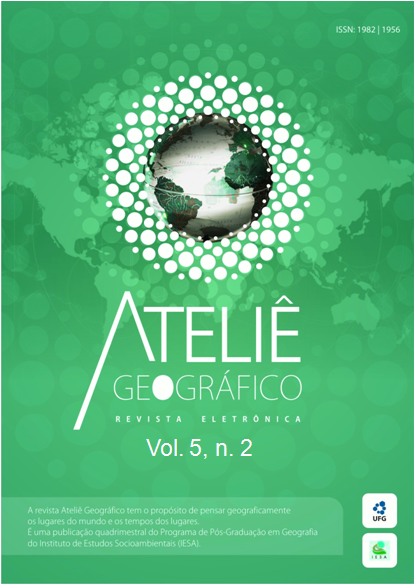A prostituição feminina “fechada” na cidade do Rio de Janeiro: dinâmica e organização espacial - DOI 10.5216/ag.v5i2.15492
DOI:
https://doi.org/10.5216/ag.v5i2.15492Resumo
A presente pesquisa objetiva analisar a dinâmica e a dimensão espacial da prostituição feminina “fechada” na urbe carioca, tendo por recorte temporal o final dos anos 90, do século XX, e, sobretudo, o início do século XXI, quando a mesma tornou-se bastante difundida e disseminada. Para tanto, realizou-se coleta em anúncios de jornais, de panfletos distribuídos em logradouros da Área Central, além de sites e blogs para identificação dos principais bairros, logradouros, estabelecimentos e características das profissionais do sexo, sendo complementado com pesquisas de campo realizadas entre 2004 e 2011. Sendo assim, a prostituição feminina “fechada” ganha destaque nos principais centros do país, sobretudo nas metrópoles e, no Rio de Janeiro apresenta-se distribuída por imóveis localizados em alguns logradouros da Área Central e em diferentes bairros das Zonas Sul e Oeste.Downloads
Não há dados estatísticos.
Downloads
Publicado
2011-08-26
Como Citar
RIBEIRO, Miguel Angelo; OLIVEIRA, Rafael da Silva. A prostituição feminina “fechada” na cidade do Rio de Janeiro: dinâmica e organização espacial - DOI 10.5216/ag.v5i2.15492. Ateliê Geográfico, Goiânia, v. 5, n. 2, p. 277–291, 2011. DOI: 10.5216/ag.v5i2.15492. Disponível em: https://revistas.ufg.br/atelie/article/view/15492. Acesso em: 11 fev. 2026.
Edição
Seção
Artigos
Licença
Autores que publicam nesta revista concordam com os seguintes termos:- Autores mantém os direitos autorais e concedem à revista o direito de primeira publicação, com o trabalho simultaneamente licenciado sob a Licença Creative Commons Attribution que permite o compartilhamento do trabalho com reconhecimento da autoria e publicação inicial nesta revista.
- Os autores não serão remunerados pela publicação de trabalhos na Revista Ateliê Geográfico. Além disso, os conteúdos publicados são de inteira e exclusiva responsabilidade de seus autores, ainda que reservado aos editores o direito de proceder a ajustes textuais e de adequação às normas da publicação.
- Autores têm permissão e são estimulados a divulgar seu trabalho online (ex.: em repositórios institucionais ou na sua página pessoal), já que isso pode gerar alterações produtivas, bem como aumentar o impacto e a citação do trabalho publicado (Veja O Efeito do Acesso Livre).


